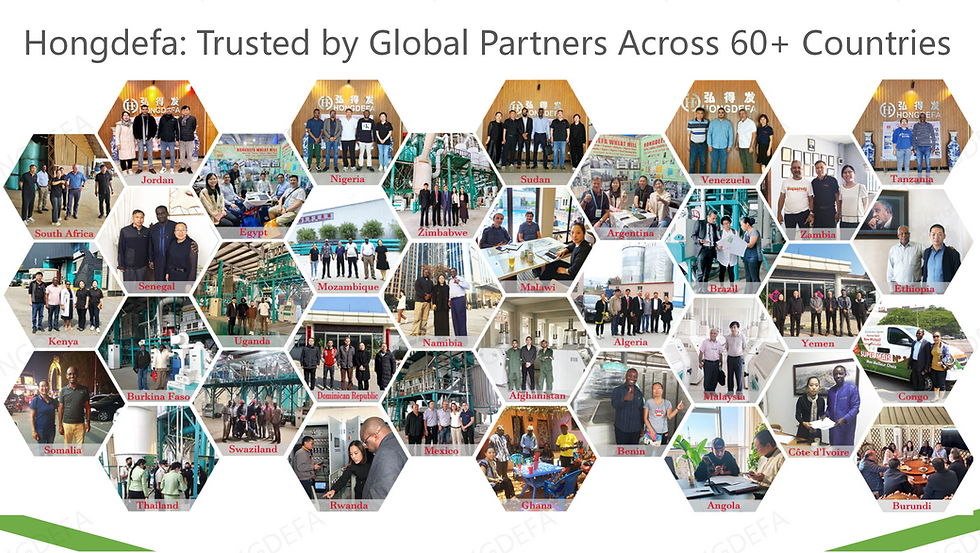Start Your Own Maize Flour Mill in Nigeria: What You Need to Know
- Jane Liu

- Jul 30
- 4 min read
Updated: Jul 31
Introduction: A Growing Opportunity in a Staple Industry
In Nigeria, maize—commonly called “Oka” in many regions—is more than just a crop. It’s a daily staple that supports millions of families and industries. From pap (known locally as Ogi or Akamu), to tuwo (Tuwon Masara in the north), to agidi/eko, maize flour forms the backbone of many traditional and modern diets.
As Nigeria’s population continues to grow, so does the demand for processed maize products. The maize milling business is one of the most stable and high-potential sectors in Nigeria’s agro-processing industry.
Hongdefa Machinery, a leading Chinese manufacturer of maize milling machine, has helped dozens of Nigerian entrepreneurs tap into this growing demand by providing reliable, easy-to-operate machines with strong local support. Whether you're a farmer looking to add value to your harvest or an investor seeking a sustainable business model, starting a maize flour mill in Nigeria is a highly rewarding venture.
Step 1: Understand the Nigerian Maize Flour Market
Nigeria is Africa’s largest maize producer, yet it still imports some processed maize products — a market gap that local millers can confidently fill. The key consumption hubs include Lagos, Kano, Ibadan, and Abuja, where both rural and urban demand is booming.
You need to understand your target market:
Fine flour for urban and bakery use
Coarser flour for local dishes in rural areas
Industrial-grade flour for food processors and feed mills
Hongdefa’s milling systems allow for adjustable granularity, making them ideal for meeting diverse customer preferences. Their machines are already used in several Nigerian regions to produce exactly these product variations.
Step 2: Choose the Right Milling Location
Location affects your profitability. Many millers succeed by positioning their factories close to:
Maize-growing regions like Kaduna, Benue, or Niger State – to reduce raw material cost
Large cities like Lagos and Abuja – to be near the final consumer
Also consider infrastructure like roads, electricity, and water supply. Hongdefa engineers can assess your chosen site and recommend the best layout, optimizing workflow and cost-efficiency.
Project Highlights by Region
Katsina State
30T/24H Maize Milling Line
60T/24H upgraded to 300T/24H – a milestone of large-scale production
100T/24H Plant
Kano State
100T/24H upgraded to 240T/24H
Three (3) separate 30T/24H maize mills in operation
Kaduna
12T/24H Small-scale maize mill for local market processing
Abuja (Federal Capital Territory)
30T/24H line serving both local demand and distribution
Makurdi (Benue State)
100T/24H plant in a maize-rich belt of Nigeria
Benin City (Edo State)
30T/24H project for regional flour supply
Minna (Niger State)
30T/24H maize flour mill
Jos (Plateau State)
150T/24H maize processing line
Ilorin (Kwara State)
150T/24H maize mill
500T grain storage silo system
30T/24H rice milling line – demonstrating diversified grain processing
Upgraded from 60TPD to 300TPD plant in Katsina, showing how scalable the business can become
Step 3: Select the Right Milling Machine
The heart of your business is your equipment. Many Nigerian millers have trusted Hongdefa for their:
Energy-efficient designs
Modular systems (5TPD to 500TPD or more)
Low maintenance needs
Adaptability to Nigeria’s power and skill conditions
A complete Hongdefa maize milling line typically includes:
Maize cleaner
Degerminator
Roller mill or hammer mill
Plansifter
Packing machine
You can start small and upgrade over time. For example, a client in Kano started with 20TPD, then later expanded to 100TPD with Hongdefa’s modular upgrade support.
Step 4: Register and Certify Your Milling Business
To run legally and gain market trust, you must obtain:
CAC (Corporate Affairs Commission) – for company registration
NAFDAC – for food hygiene and safety
SON (Standards Organisation of Nigeria) – to meet flour quality benchmarks
Local government permits – for environmental and zoning compliance
Hongdefa’s after-sales team assists clients in documentation by providing necessary technical drawings, machine specifications, and process flow charts for smooth approval.
Step 5: Estimate Your Costs and Profit Margins
Your initial investment will vary based on capacity:
10TPD line: Suitable for rural markets or community co-ops
30–60TPD: Mid-size investors targeting urban demand
100–500TPD: Industrial-scale operations supplying nationwide distribution
Hongdefa offers competitive pricing, and clients often report 30–50% cost savings over the equipment's lifespan due to energy efficiency and local servicing.
Well-maintained Hongdefa machines offer high yield, low waste, and consistent product quality, all crucial for long-term profitability.
Why Choose Hongdefa for Your Maize Milling Business?
From equipment supply to site installation and operator training, Hongdefa supports you throughout. Here’s why Nigerian millers choose Hongdefa:
✅ Over 60 successful installations across Africa, including Nigeria, Ghana, Ethiopia, Kenya, and Zambia
✅ Local agents and engineers available for fast response
✅ Machines compatible with SON and NAFDAC certification requirements
✅ Spare parts stocked for prompt replacement
✅ Custom designs for Nigerian voltage standards and operating conditions
Whether in Kano, Lagos, Jos, or Port Harcourt, Hongdefa has left a trail of satisfied millers scaling their businesses confidently.
Conclusion: Start Smart, Scale Confidently
The maize milling industry in Nigeria is rich with opportunity. With the right plan, reliable machinery, and regulatory compliance, your mill can grow into a lasting enterprise.
Hongdefa Machinery is proud to be a long-term partner for Nigerian millers. We don't just sell machines—we build businesses.
Take the First Step Today
Contact Hongdefa for a customized maize milling solution that fits your budget and market.
Jane: +86 139 3305 7265













Comments